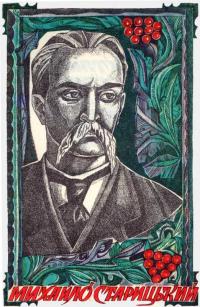Michael Starycky
Michael P. Starycky (Starytsky; 2 (14) November 1839, village Klischyntsi (now Chornobai district of Cherkasy reg.) – 14 (27) April 1904, Kyiv) – Ukrainian writer and theatrical figure.
The future writer was born in a family of small landlord, a retired rotmistr. Boy was left an orphan early: in 1848 his father died, and in 1852 – was died mother. Michael took care of his great- uncle on his mother – Vitaliy Lysenko. Then struck up a strong friendship with the son of Michael's marker – Mykola Lysenko, future Ukrainian composer.
In 1851 – 1856 years Michael studied at the Poltava gymnasium; in 1858 with Nikolai Lysenko entered the Kharkov University. In 1865 he graduated from the law faculty of Kyiv University, but he don't serve in any offices and diploma was not amiss.
In 1862 Michael married Sophia V. Lysenko (sister of Nicholas). They had three daughters, the oldest Lyudmila became a writer, the middle Mary – actress; youngest Oksana married witg Ivan Steshenko – Ukrainian public and political figure.
Starycky's creativity began in 1865 as a poet. His first poems were published in Lviv magazine "Niva". He continued to write poetry until his death.
In 1871 he and M. V. Lysenko organized the first Ukrainian theater company and he was closely involved in the affairs of the theater until 1895. From Staritsky's company came out all luminaries Ukrainian theater. Starycky wrote the libretto to many Lysenko's operas. As Ukrainian theater repertoire was almost non-existent, Starycky carefully started to create it – by writing original plays and remaking and staging works of other authors. Such remaking at that time don't considered copyright infringement, but in the early 20th century Staritsky was charged with plagiarism. The case dragged four years and ended in favor Staritsky.
Special attention Starycky paid for translations, of which the most famous "Serbian Folk Songs" (1876) and " Hamlet" by William Shakespeare (1882).
In the last decade of his life Starycky wrote greatest prose works – a series of historical novels and stories of contemporary life. In this work he helped the daughter Lyudmila. Since she was deported by the Russian criminal authorities in fictional "case SVU" (1929 – 1930 years) and expelled from official literary life, her co-authorship always suppressed and even denied. The nature of creative collaboration of Michael and Ludmilla Staritsky remains to be seen.
Staritsky's prose mostly written in Russian and published in Moscow. Ukrainian language in the Russian Empire was prohibited by Ems law (1876) – until its abolition Starycky not lived. So Ukrainian publishing houses as instant companies did not exist, and therefore there were no royalties that would pay Russian publishing houses.
Now some of these works have been translated into Ukrainian.
In 1890's Michael Starycky devoted considerable attention to the education of young Ukrainian writers united in an informal circle "Galaxy". Most valuable diamond in circle was Lesja Ukrainka, Ukrainian significant contribution to literature made members of the group Lyudmila Starytska, Vladimir Samiylenko, Ivan Steshenko, Maxim Slavynsky, Alexander Sudovschykova (Grycko Grigorenko).
Please be aware that Starycky in his works took many neologisms that in the 1870's and 80's were called "forged words" (ie, artificially formed, it was unfavorable rating). But at the end of his life many words introduced by him have entered the main fund of the Ukrainian language, and now we can not imagine that it ever had words like "dream" or "indifference."
Died Michael Starycky in Kiev. In his native village and in Kiev in on the Saksagansky street, where he lived in the 1901 – 1904, the museum of writer were opened. Please be aware that an ancient village Klischyntsi submerged Kremenchug reservoir, the modern village moved to the raised position.
Although Michael Starytsky belonged to the generation of "apolitical culture figures" and took no part in the political struggle, the Soviet authorities treated him coldly and carefully. Complete reprint of his literary heritage we don't have, the most complete collection was published in 1963 – 1965 years (in 8 volumes) and in 1989 (in 6 volumes).
M. Zh. September 23, 2013.

